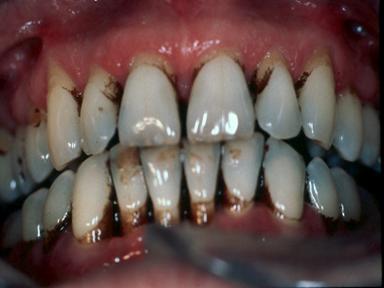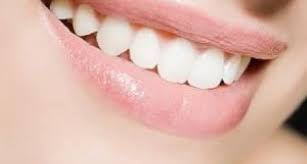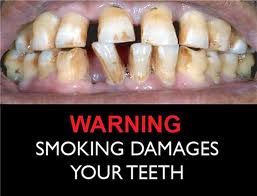Introduction
Those who smoking, by quitting smoking you may significantly improve your oral health.
 |
|
 |
|
Tobacco stained teeth
|
|
Non stained teeth
|
|
Fig 1: Difference between stained and non-stained teeth
|
||
How Smoking May Affects Your Oral Health

Current study suggested that smoking suppresses the immune system, leaving gums prone to infection. In fact, research has shown that smokers were more than 50 percent more likely to develop gum disease than non-smokers. If you care enough and want to improve your oral health, here is a list of reasons for you to quit smoking.
- Smokers are at risks of losing their teeth two times more than that of non-smokers, due to plaque and tartar build up that encourages dental decay.
- Smokers are two time more prone to suffer from Infected exposed roots of teeth when compared to non-smokers, due to poorer gum conditions. Exposed roots are more sensitive to hot and cold foods and beverages, making eating painful.
- Smoking reduces your ability to fight infection throughout the body, including in the mouth and gums.
- Smoking causes bad breath (and it’s much more pleasant to kiss a non-smoker!)
- Smoking slows your body’s ability to heal from injury or surgery (including tooth extraction and oral surgery). This makes smoker’s poor candidate for any surgical dental procedures even if the best technology and treatment is available due to possibility of impaired healing.
- Smoking reduces the effectiveness of gum disease treatments (periodontal treatment) that stop or delay tooth loss.
- Smoking can cause staining of teeth and filling restorations (Did you know studies indicate that most people consider a white, healthy smile as an indicator of youth and vigour?)
- Smoking can cause inflammation of the salivary gland openings on the roof of the mouth.
- Smoking (tobacco use) increases the risk of developing cancer.2 (According to the American Cancer Society, about 90% of people with cancer of the mouth, lips, tongue and throat use tobacco, and the risk increases with the amount smoked or chewed and the duration of the habit. Smokers are six times more likely than non-smokers to develop these cancers.)
- Smoking is a major risk factor for gum diseases. The prevalence and severity of periodontal attachment breaks down gets worse with higher level of smoking. Gum diseases are difficult to treat as long as you continue to smoke.
Can Quitting Improve Your Oral Health?
Quitting can significantly improve your oral health by :
-
Reducing risks of dental diseases
No matter how long you’ve used tobacco products, quitting now can significantly reduce your risk of gum disease, tooth loss and many other oral health problems. Even reducing the amount you smoke appears to have incremental benefits. When you quit, many of these health risks will diminish until they are almost at levels for non-smokers.
-
Ensure healthier gums
Cigarette smokers who quit the habit may reap the benefit in the form of healthier gums. This may help them hold on to their teeth over the long run. Smokers with gum diseases will experience a significant improvement in their gum disease within one year of quitting compared with those who kept smoking.
-
Improving sense of smell and taste
Giving up smoking is not easy, but many people have succeeded in quitting. Soon after you stop smoking, you may notice that your sense of smell is more acute, food taste better and you can more easily be active without getting winded.Most importantly, you will have the satisfaction of knowing that you are keeping your mouth and your entire body healthy.
-
Prevents unbearable halitosis /boost confidence when socializing
If you are bothered by bad breath from smoking .Quitting will help you reduces bad breath and boost your confidence when socializing with people around you. -
Improves blood circulation to oral tissues
Quitting smoking will improve capillary and arteriolar blood flow. This helps delays facial wrinkling and premature ageing and make your appearance becomes more radiant and fresh looking.
But more importantly, once your blood circulation has improved, you may now think about of getting dental treatment like orthodontic, crowns or surgical interventions for implants or gum surgery to improve your appearance.
-
Improve aesthetics of your dentition
As long as you smoke, it is very difficult to remove nicotine stains from your teeth with great success. Even after scaling, the stains will recur soon after. You can only avoid recurrence when you quit. As long as you still smoke, treatment outcome is only temporary. So if you are aiming for long term success, you must quit.
What Should You Do Now?
Quitting is a truly positive step to take. If you accept the challenge to quit and succeed, you will experience a boost in confidence which will carry over to all areas of your life. If you are currently smoking,talk to your doctor about quitting today, and start your new, healthier life as a non-smoker! Quit smoke to better oral health.
If you are not smoking now, do not start.
Where To Get Quit Help
- Quit line : Tel 03-888334400
- Identify quit clinic services nearest to you (Public or private services). If you cannot afford to pay, try the quit services provided by the health centres on Tuesday or Thursday afternoon.
- Get more information regarding quit smoking through www.myhealth.gov.my
- Get information from your school counsellors.
References
- Smoking and Oral Health. Web MD. October 26,2012. Retrieved from: http://www.webmd.com/oral-health/guide/smoking-oral-health
- Smoking Nearly Doubles Root Canal Requirements. MedPage. October 29, 2012. Retrieved from: http://www.medpagetoday.com/PrimaryCare/DentalHealth/2736
- U.S. Department of Health and Human Services. The health consequences of smoking: a report of the Surgeon General. Atlanta, GA: U.S. Department of Health and Human Services, Centers for Disease Control and Prevention, National Center for Chronic Disease Prevention and Health Promotion, Office on Smoking and Health, 2004.
| Last Reviewed | : | 23 August 2019 |
| Writer | : | Dr. Lydia Mason ak Lionel |
| Accreditor / Reviewer | : | Dr. Sharol Lail bin Sujak |







